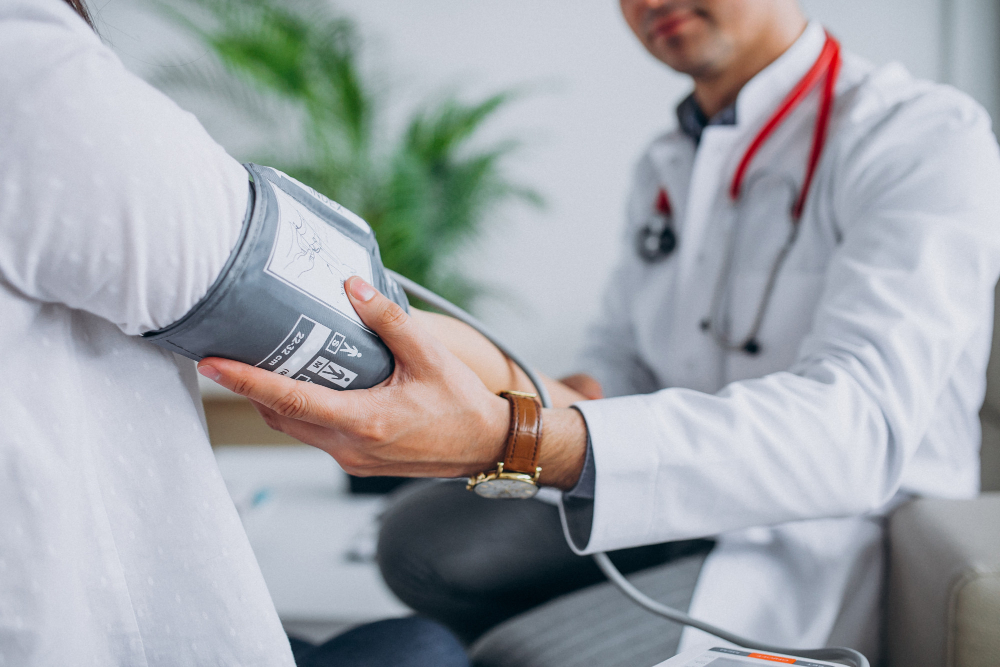Hypertension

Introduction to Hypertension (High Blood Pressure)
Hypertension, commonly known as high blood pressure, is a condition where the force of the blood against the artery walls is consistently too high. It is a prevalent health issue that can lead to severe complications, such as heart disease, stroke, and kidney failure if left untreated. Managing hypertension is crucial for maintaining overall health and preventing life-threatening conditions.
Understanding Blood Pressure Readings
Systolic and Diastolic Pressure
Blood pressure readings consist of two numbers: systolic and diastolic pressure. The systolic number, the higher of the two, measures the pressure in the arteries when the heart beats. The diastolic number, the lower figure, measures the pressure in the arteries between heartbeats.
Normal and High Blood Pressure Ranges
- Normal Blood Pressure: Less than 120/80 mm Hg
- Elevated Blood Pressure: Systolic 120-129 and diastolic less than 80 mm Hg
- Hypertension Stage 1: Systolic 130-139 or diastolic 80-89 mm Hg
- Hypertension Stage 2: Systolic 140 or higher or diastolic 90 mm Hg or higher
- Hypertensive Crisis: Systolic higher than 180 or diastolic higher than 120 mm Hg (requires immediate medical attention)
Causes and Risk Factors
Genetic and Lifestyle Factors
- Genetics: Family history of hypertension increases the risk.
- Age: Blood pressure tends to increase with age.
- Gender: Men are more likely to develop hypertension before age 55, while women are more likely to develop it after 55.
- Race: Hypertension is more common and tends to be more severe in African Americans.
- Obesity: Excess weight increases the risk of high blood pressure.
Lifestyle and Environmental Factors
- Diet: High salt intake, low potassium intake, and excessive alcohol consumption contribute to hypertension.
- Physical Inactivity: Sedentary lifestyle increases the risk.
- Stress: Chronic stress can lead to high blood pressure.
- Smoking: Tobacco use raises blood pressure temporarily and damages artery walls.
Symptoms of Hypertension
Hypertension is often called the “silent killer” because it typically has no symptoms until it causes significant damage. However, some people with high blood pressure may experience:
- Headaches: Particularly in the morning.
- Dizziness: Or feeling lightheaded.
- Shortness of Breath: During physical activities or even at rest.
- Nosebleeds: Uncommon but possible in severe cases.
Diagnosis of Hypertension
Measuring Blood Pressure
Blood pressure is measured using a cuff and a gauge. Regular monitoring is essential, as blood pressure can fluctuate throughout the day.
Ambulatory Blood Pressure Monitoring
This method involves wearing a device that measures blood pressure at regular intervals over 24 hours, providing a comprehensive view of blood pressure changes throughout the day and night.
Additional Tests
To determine the impact of hypertension on the body and identify any underlying causes, doctors may recommend:
- Blood Tests: To check for cholesterol levels, kidney function, and other indicators.
- Urine Tests: To detect signs of kidney problems.
- Electrocardiogram (ECG): To assess heart health and detect any abnormalities.
- Echocardiogram: An ultrasound of the heart to check for damage or abnormalities.
Treatment Options for Hypertension
Lifestyle Modifications
- Healthy Diet: Emphasize fruits, vegetables, whole grains, and lean proteins. The DASH (Dietary Approaches to Stop Hypertension) diet is particularly effective.
- Regular Exercise: Aim for at least 150 minutes of moderate-intensity exercise per week.
- Weight Management: Losing even a small amount of weight can significantly lower blood pressure.
- Reducing Salt Intake: Limiting sodium to less than 2,300 mg per day, or ideally 1,500 mg, can help control blood pressure.
- Limiting Alcohol: Moderate alcohol consumption, if any.
Medications
- Diuretics: Help the kidneys remove excess salt and water.
- ACE Inhibitors: Relax blood vessels by blocking the formation of a natural chemical that narrows blood vessels.
- Angiotensin II Receptor Blockers (ARBs): Relax blood vessels by blocking the action of a natural chemical.
- Calcium Channel Blockers: Prevent calcium from entering the heart and blood vessel walls, reducing blood pressure.
- Beta-Blockers: Reduce the workload on the heart and open blood vessels.
Complications of Untreated Hypertension
Cardiovascular Disease
- Heart Attack: High blood pressure can lead to the hardening and thickening of the arteries, increasing the risk of a heart attack.
- Heart Failure: The heart has to work harder to pump blood, which can lead to heart failure.
Stroke
Hypertension can cause blood vessels in the brain to burst or become blocked, leading to a stroke.
Kidney Damage
High blood pressure can damage the arteries around the kidneys, leading to kidney disease or failure.
Vision Loss
Damage to the blood vessels in the eyes can lead to vision problems or blindness.
Metabolic Syndrome
This syndrome is a cluster of disorders related to the body’s metabolism, including increased waist circumference, high triglycerides, low HDL cholesterol, high blood pressure, and high blood sugar.
